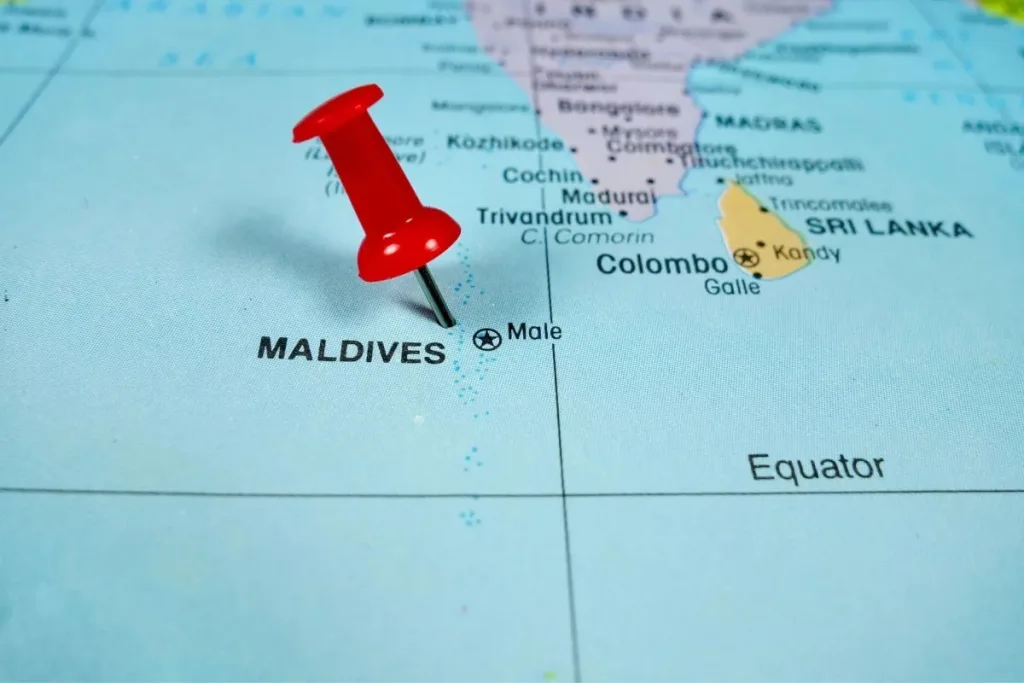Syllabus: GS2/IR
Context
- Prime Minister Narendra Modi and the President of Maldives comprehensively reviewed the bilateral ties.
About
- The Prime Minister underscored the importance of Maldives under its ‘Neighbourhood First’ Policy and Vision SAGAR, and reaffirmed India’s commitment to assist Maldives on its developmental journey and priorities.
- India has extended support of 400 million dollars and a bilateral currency swap of 3,000 crore rupees to the Maldives.
- The support will be instrumental in tackling the ongoing financial challenges faced by the Maldives.
Evolution of India and Maldives Relations
- Early Diplomatic Ties (1965-1978): The Maldives gained independence from the British in 1965, and established diplomatic relations with India.
- India was one of the first countries to recognize the Maldives as an independent nation.
- Strategic Partnership (1978-1988): The signing of the Maritime Boundary Agreement in 1979 helped define the maritime boundaries between the two countries.
- Political Turbulence (1988-2008): The relationship faced challenges in 1988 when a coup attempt in the Maldives led to the intervention of Indian forces in Operation Cactus.
- India’s military intervention was aimed at thwarting the coup and preserving the Maldives’ political stability.
- This event temporarily strained diplomatic relations but was later resolved.
- Normalization and Economic Cooperation (2008-2013): In 2008, the Maldives experienced a peaceful political transition, and Mohamed Nasheed became the President.
- The relationship between India and the Maldives improved, focusing on economic cooperation, trade, and people-to-people ties.
- India provided developmental assistance to the Maldives, particularly in infrastructure projects and capacity building.
- Period of Strain (2013-2018): The relationship faced challenges during the presidency of Abdulla Yameen, with concerns over issues such as democratic backsliding, human rights, and a perceived tilt towards China.
- The Maldives’ growing engagement with China, including infrastructure projects under the Belt and Road Initiative, raised strategic concerns for India.
- Renewed Engagement (2018-2023): The election of Ibrahim Mohamed Solih as the President of the Maldives in 2018 marked a shift in bilateral relations. There was a renewed emphasis on strengthening ties with India.
- The two countries reaffirmed their commitment to democratic values, and India extended financial assistance for various developmental projects.
Significance of Maldives:
- Strategic Importance: The Maldives is strategically located in the Indian Ocean, and its stability and security are of interest to India.
- Trade Route: Situated along crucial maritime trade routes between the Gulf of Aden and the Strait of Malacca, the Maldives acts as a “toll gate” for nearly half of India’s external trade and 80% of its energy imports.

- Counterbalancing China: Maldives presents an opportunity for India to counterbalance China’s growing influence in the Indian Ocean, fostering regional balance of power.
Brief on India – Maldives
- Participation in Multiple Forums: Both nations are founding members of the South Asian Association for Regional Cooperation (SAARC), the South Asian Economic Union and signatories to the South Asia Free Trade Agreement.
- Economic partnership: India emerged as Maldives’ 2nd largest trade partner in 2022 & the largest in 2023.
- India is one of the biggest investors and tourism markets for the Maldives, with significant trade and infrastructure projects underway.
- Defense and Security Cooperation: Since 1988, defence and security has been a major area of cooperation between India and Maldives.
- A comprehensive Action Plan for Defence was also signed in 2016 to consolidate defence partnership.
- Estimates suggest that almost 70 per cent of Maldives’ defence training is done by India — either on the islands or in India’s elite military academies.
- Tourism: In 2023, India is the leading source market for Maldives with a 11.8% market share.
- In March 2022, India & Maldives agreed for an open skies arrangement which will further improve connectivity between two countries.
- Connectivity: The Male to Thilafushi Link project, popularly known as the Greater Male Connectivity Project (GMCP), is a USD 530 million infrastructure project aimed at establishing a direct link between the capital city of the Maldives and Thilafushi, an island located in the South Indian Ocean.
Challenges:
- Domestic turmoil in the Maldives: Recent political upheavals and changes in government create uncertainty and complicate long-term cooperation projects.
- Chinese Influence: China’s growing economic presence in the Maldives, evidenced by investments in infrastructure projects and debt-trap diplomacy, is perceived as a challenge to India’s strategic interests in the region.
- Chinese naval expansion and potential military ambitions in the Indian Ocean with the active support from Maldives can raise concerns for India.
- Non-traditional threats: Piracy, terrorism, and drug trafficking remain concerns in the region, requiring continuous collaboration and intelligence sharing between India and the Maldives.
- Extremism and radicalization: The Maldives’ vulnerability to religious extremism and radicalization poses a security threat that necessitates joint efforts in countering such ideologies.
- Trade imbalance: The significant trade imbalance between India and the Maldives leads to resentment and calls for diversifying trade partnerships.
Way Ahead
- The evolution of India-Maldives relations reflects a combination of geopolitical dynamics, changes in leadership, and shared regional interests.
- India is steadfast in its commitments towards Maldives and has always walked the extra mile towards building relations.
- Any impulsive steps to undo the carefully nurtured all encompassing partnership is likely to harm Maldives more than it would India.
- By acknowledging and addressing the challenges, India and the Maldives can navigate the complexities of their relationship and build a stronger, more resilient, and mutually beneficial partnership for the future.
Source: AIR
Previous article
Draft National Sports Policy 2024
Next article
Universal Health Coverage (UHC)